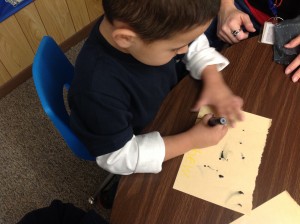 Why isn’t my child talking yet? Why doesn’t my child play with (or like) other children? These are the two questions that I encounter most frequently when I talk with a concerned parent or preschool teacher. Thus, these are the questions that my Early Childhood Assessments are designed to answer. Testing shouldn’t begin and end with a diagnosis. After testing, I don’t consider it nearly adequate to say to a parent, ‘yeah, your child has delays in this or that area and thus qualifies for special services.’ My written and video reports are composed, edited and revised to make sense to teachers, therapists, and parents. Above all, they are designed to suggest strategies, learning materials, and suggestions for addressing the child’s educational difficulties.
Why isn’t my child talking yet? Why doesn’t my child play with (or like) other children? These are the two questions that I encounter most frequently when I talk with a concerned parent or preschool teacher. Thus, these are the questions that my Early Childhood Assessments are designed to answer. Testing shouldn’t begin and end with a diagnosis. After testing, I don’t consider it nearly adequate to say to a parent, ‘yeah, your child has delays in this or that area and thus qualifies for special services.’ My written and video reports are composed, edited and revised to make sense to teachers, therapists, and parents. Above all, they are designed to suggest strategies, learning materials, and suggestions for addressing the child’s educational difficulties.
In most cases when I am assessing preschool age children, I will find that there are problems with either receptive or expressive language if not in both of these areas. I like to do a good enough job of testing and report writing to be able to say (and show) parents and teachers: “We’re all going to work together to help this student develop the language and behavioral skills that he will need to be successful in ‘real school’ in a few years. Here’s precisely where we’ll start, here’s what we’ll do, here’s how we monitor progress and adjust goals, and here’s how we’ll know when we’ve gotten to where we aimed to go.”
In the past I used conventional intelligence and achievement test kits that were normed for children who are as young as two years six months. While those test kits ask questions that young children should know the answers to, they don’t provide developmentally appropriate ways for children to respond to those questions. The ‘regular tests’ used by most assessment professionals provide standardized scores that make it easy to qualify children for services, but they are geared toward children who are old enough to sit in a desk and raise their hands to obtain the teacher’s attention and as such are not developmentally appropriate for the children they purport to assess. Or (and this is far worse in my mind), test results are based upon what the adult reports to be typical for that particular child. In essence, traditional test kits don’t yield enough information about children’s competencies or weaknesses; this is why I began using play-based assessments for my early childhood referrals some years ago. My test protocols and procedures are based upon the Toni Linder trans-disciplinary team approach toward evaluating learning competencies and creating educational treatment plans for at-risk preschool children.
A play-based assessment observes and interacts with the whole child in a flexible manner that allows examiners to choose toys and assessment tools that are motivating to the individual child. I involve parents and caregivers in the evaluation process in order to develop meaningful educational goals and educational treatment plans based upon the child’s current developmental functioning in these areas: language, cognition, sensorimotor, gross and fine motor functioning, social-emotional development, adaptive skills, and social/pragmatic functioning. An Early Childhood Assessment is appropriate for children who are developmentally six years of age and under and typically requires one to two hours to conduct. My assessments are useful for identifying children for early intervention programs; my educational treatment plans, and the assessment and recommendations videos that I create to accompany written reports assist parents, teachers, and therapists in planning educational programs, updating educational progress, and moving children toward meaningful participation in grade level elementary programs.
